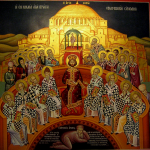There’s this misconception that religion and faith are only there so that people can feel mildly better about themselves and their lives and especially about dealing with their loved ones. Naysayers against religion compare faith to a crutch or a drug.
When I woke up this morning, I did not want to get out of bed to pray my daily Lectio Divina. I wanted to stay in my bed and scroll through my Instagram feed, even though I wasn’t even wearing glasses. But fighting against my lazy body, I got out of bed, put on my glasses, and started praying. Why?
To paraphrase a familiar quote, religion has a dual purpose: to comfort the afflicted and to afflict the comfortable.
My friend Justin AKA “ChurchTriumphant” on YouTube goes more into this in one of his videos:
https://www.youtube.com/watch?v=9rlLju412TcOr to quote one of my favorite writers
“I didn’t go to religion to make me happy. I always knew a bottle of Port would do that. If you want a religion to make you feel really comfortable, I certainly don’t recommend Christianity.”- CS Lewis
Even though I love being Catholic, it’s not always easy. I’m still trying to figure out stuff about the church that I don’t understand. I don’t like debates about politics. And I don’t have a particular group that I can readily identify with beyond my circle of friends. Back in college, I divided my time between two groups: my devout, Catholic friends who introduced me to new prayers, devotions, and saints and my non-Catholic friends whom I talk to about stuff I loved like anime, Harry Potter, shows I watched at the time, etc. Very seldom did I ever find friends that encompassed both.
But maybe that’s sort of the point. No one group of people or even one particular person can satisfy us completely. And whatever we believe in can’t just be a feel-good quick fix. All the best saints struggled with some sort of problem throughout their lives and some of them were priests, sisters, brothers, and even popes. Mother Teresa struggled with a period of darkness where she felt that God was the furthest thing from her heart, to the point of almost being nonexistent. St. Maximillian Kolbe was a war prisoner. Mary, the mother of Jesus, dealt with the loss of both her husband and her child within her lifetime and had to bury both of them. Pope John Paul II had Parkinsons’ disease. Not to mention this often heard quote:
“Jacob was a cheater, Peter had a temper, David had an affair, Noah got drunk, Jonah ran from God, Paul was a murderer, Gideon was insecure, Miriam was a gossip, Martha was a worrier, Thomas was a doubter, Sara was impatient, Elijah was moody, Moses stuttered, Abraham was old,… and Lazarus was dead. God doesn’t call the qualified, He qualifies the CALLED!”
Faith has a way of changing people for the better. And change always requires a period of discomfort.
There is a difference, however, between being pushed out of your comfort zone and going to extremes in the names of whatever you believe in. It’s one thing, for example, for me to, say, go to a convention of 30,000 people and ask one of my favorite actors a question that ended up making him feel uncomfortable just because he asked. It’s another thing to do the stuff that Renee mentions in one of her Lent-themed videos. Going on extreme diets, fasts, or juice cleansing isn’t as much going out of your comfort zone so much as pushing yourself off of a cliff without a parachute and believing that you’ll land safely in the water from a thirty-story drop.
So where’s the balance? The balance is with God. It goes back to what I said about falling in love with the process. Let God guide you through whatever changes you’re going through or ask God to start a change in you right now. After all, according to science, an object at rest tends to stay at rest and an object in motion tends to stay in motion unless acted upon by an outside force.











